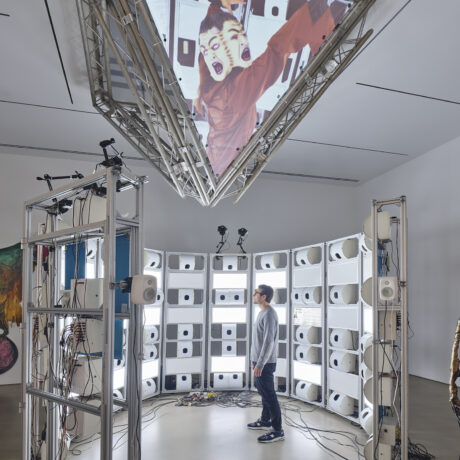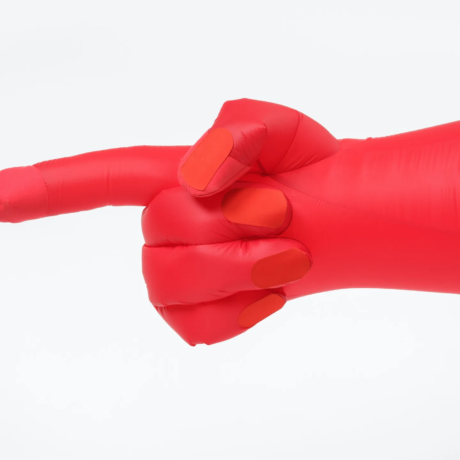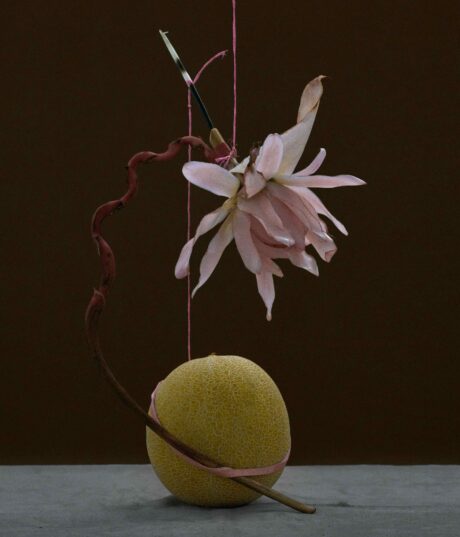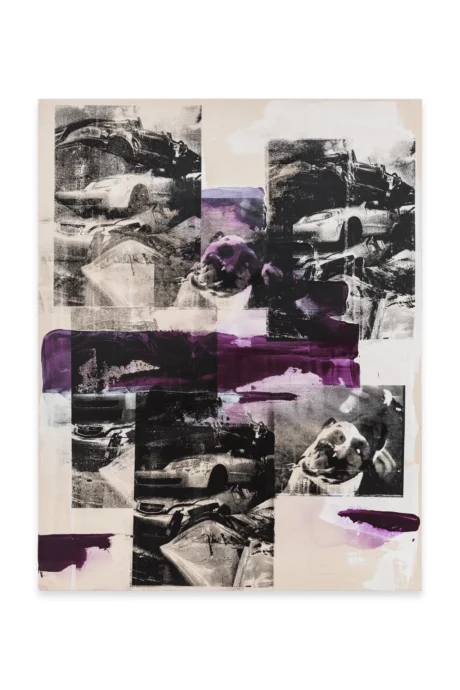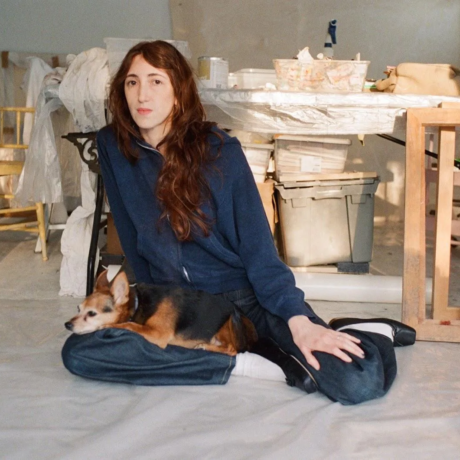For her inaugural US show, Berlin-based multidisciplinary artist Raphaela Vogel invites the viewer into her world.
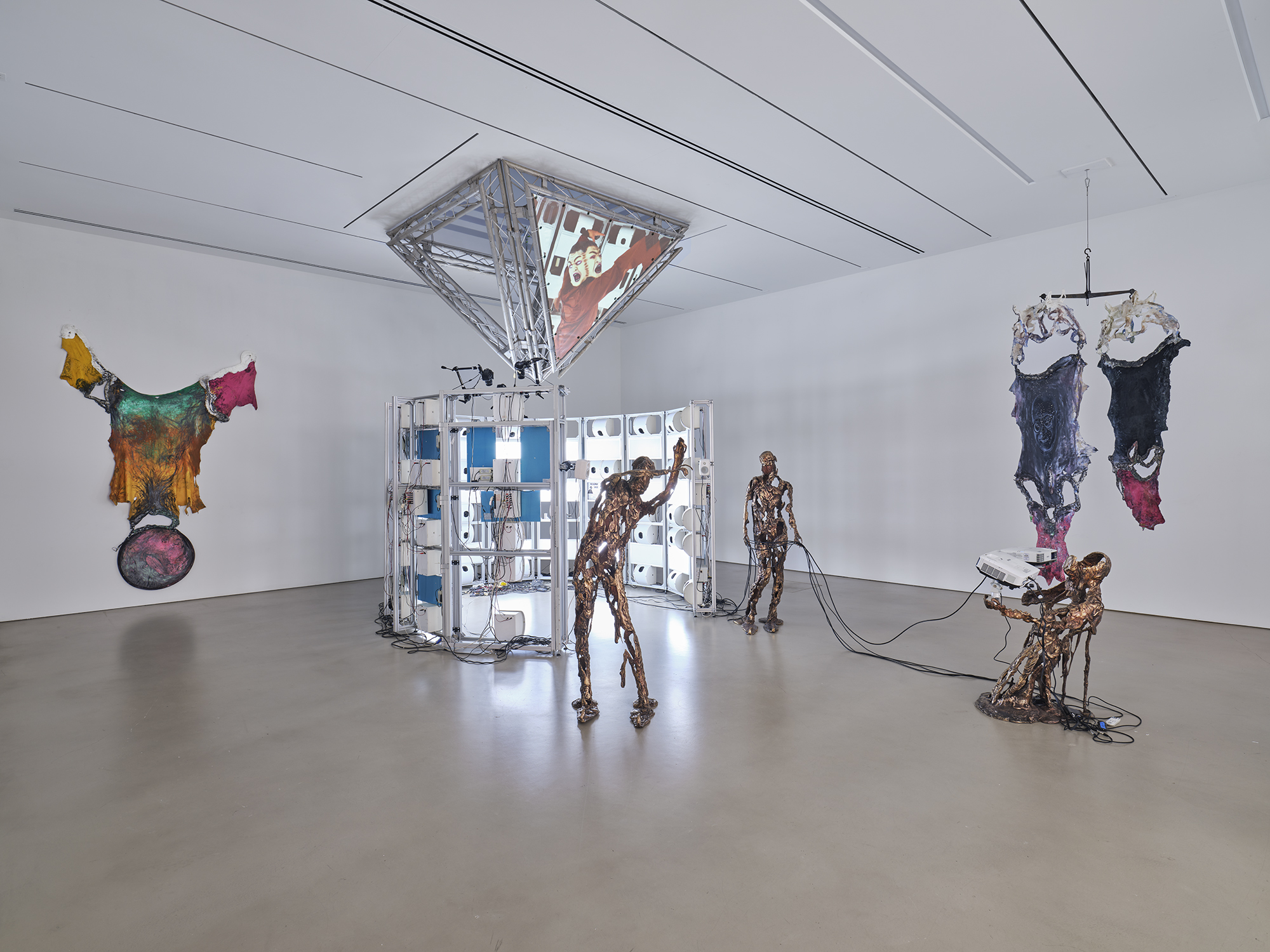
It’s a quiet morning in Chelsea. The cold January sun shines bright on yesterday’s puddles. It is already almost 11 am, and the art world is still waking up. But just off of W 25th Street, past wide-windowed galleries displaying rows of paintings, something is stirring inside Petzel: Inside its pristine white-walled foyer and behind a thick curtain, a thumping metronome builds into a light-hearted tango. A woman coolly murmurs jede frau ist schön (“every woman is beautiful”). Her heavy voice lulls with the rhythm until, suddenly, there is a shift, then a snarl. The song halts, and a cacophonous, heavy-rock melody envelopes the room; the vocals shapeshift into a guttural scream. Rapidly clicking shutters add to the soundscape: 70 cameras peer out from a dome. A 360-degree 3D scanner captures every angle of the interior.
Scaffolding-like triangular steel bars hold a canvas above the lens-walled edifice. Images of a woman flash on the canvas screen at stop-motion pace, syncing to the rhythm of the music: She is wearing a three-headed mask and dressed in a brown jumpsuit with yellow butterfly wings. She leaps and thrusts her body around in the same structure that I am now standing in, titled I Am Touching.
“If it’s not in your eyes, it’s not on your mind. That’s a saying in German.”
She is Raphaela Vogel, an enigmatic Berlin-based multidisciplinary artist whose star began to rise about a decade ago, and thus far has continued to ascend in its own idiosyncratic trajectory. Throughout her sprawling practice, Vogel has stood firmly in the eye of her own storm. In her immersive installations, she is often alone: the director, the performer, the set designer, the sculptor, the painter, the fabricator.
Now, for the first time ever, and for her inaugural solo show in the United States, the auteur is inviting others to literally step into the frame. Cables run through the space, threaded through the hands of one of three hole-y bronze figures who is holding a projector that displays the footage on a wall across from the contraption. Step carefully, or you might risk yanking them from their sockets, like what happened during the show’s crowded opening when, 10 minutes to closing, the footage glitched and froze, serendipitously, on none other than Vogel’s own bandmates.
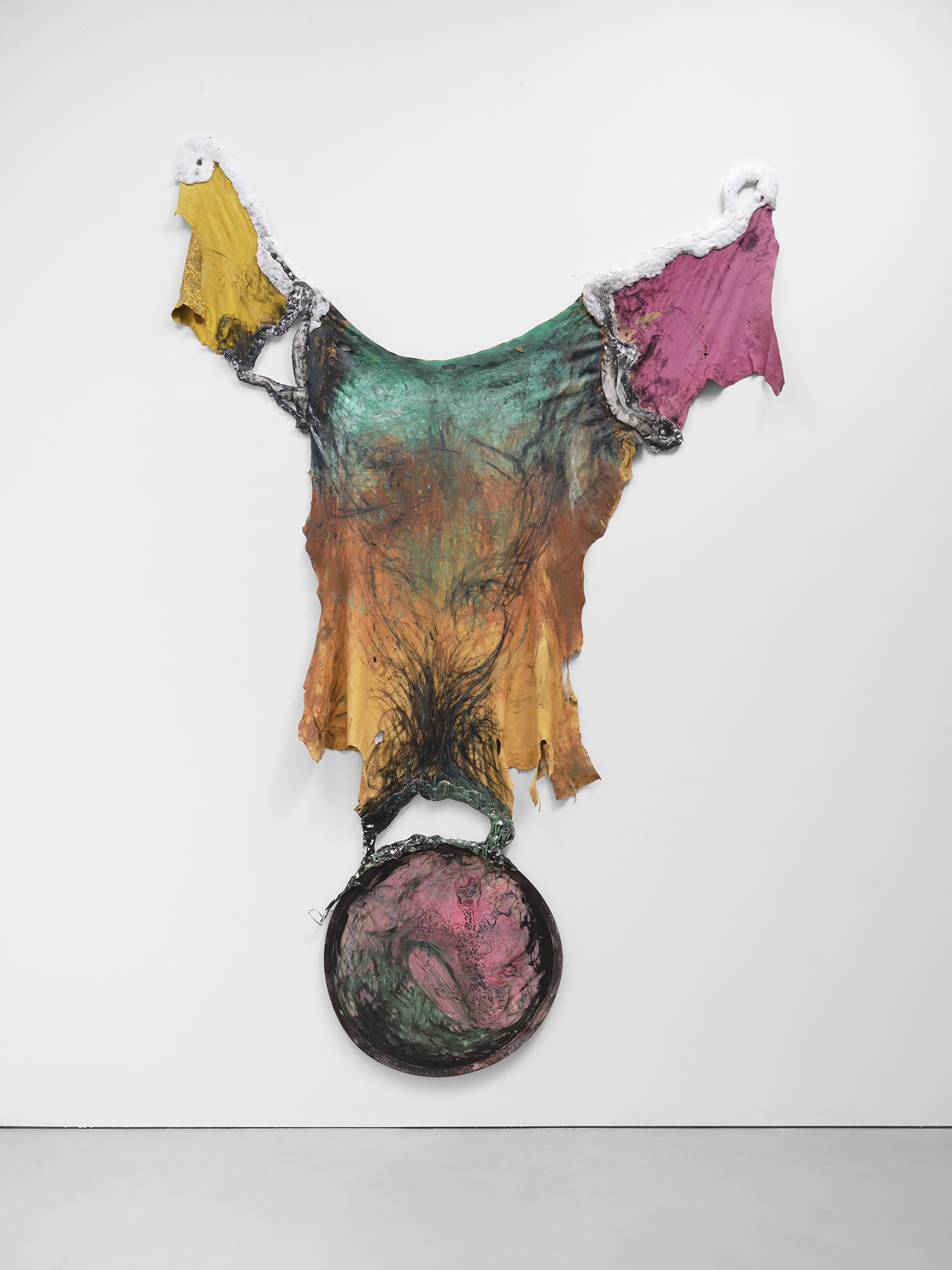
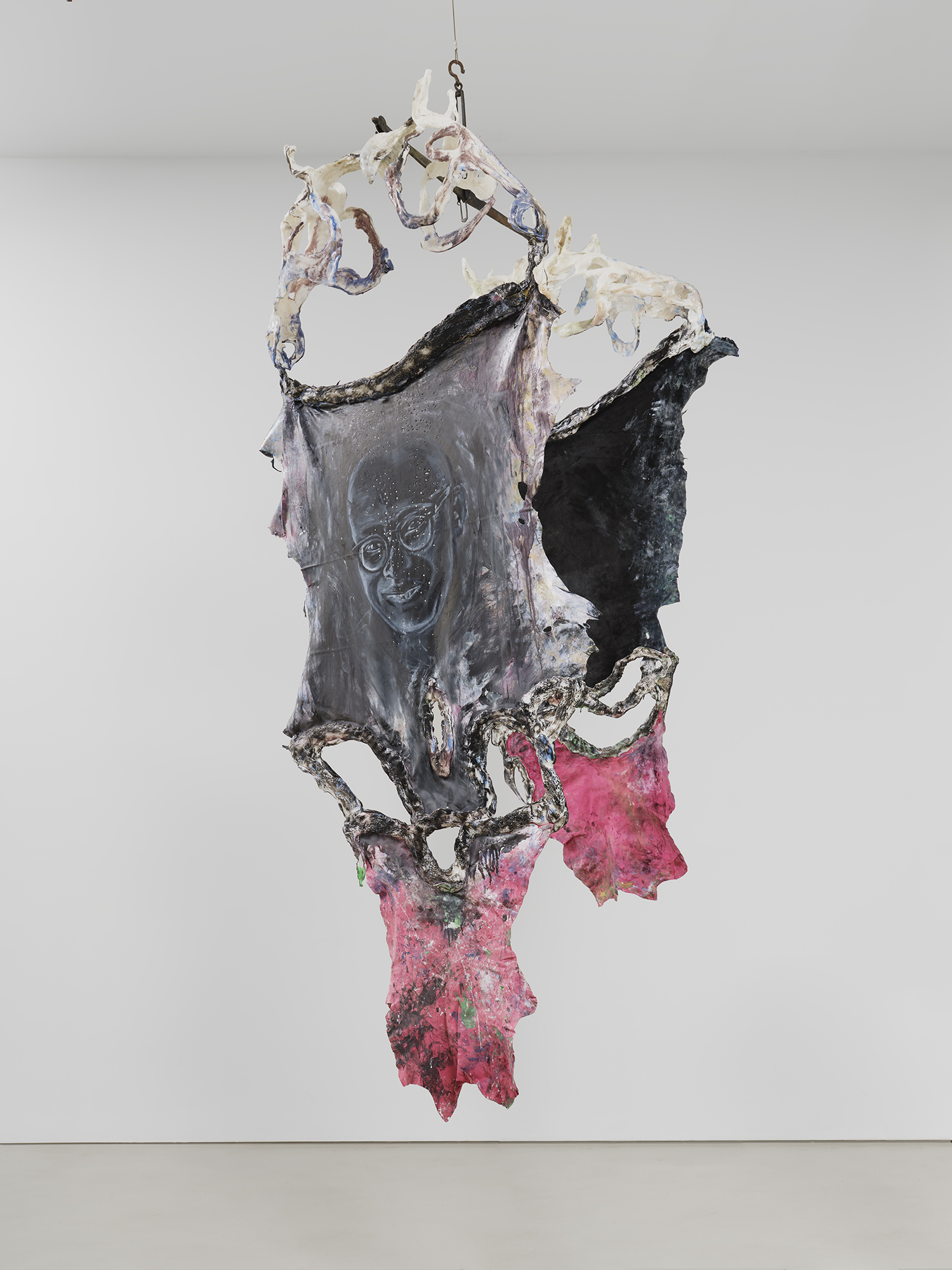
As I inspect the cameras and then the ceiling, I can hear the disorienting clicking, as if I am being paparazzied. Every angle of my body flashes onto the wall opposite the charged space. Then, it disappears. This happens again and again on a dizzying loop until I retreat outside of the machine’s view to take in the room and wait for our interview to start.
Soon, the artist will be present. Vogel arrives holding a cup of coffee and wearing an olive green trench coat, messy brown hair pulled back, smudged shimmery-brown eyeshadow, and the same black boots with a silver heel that she wore in the above photo sequence. Her eyes are intense and her disposition is friendly despite the late night she had the night before performing with her band at the Goethe-Institut—her answer to a traditional artist talk.
Today, her voice is more lilting, less deep and unnerving than the recording. “This is a tango; I found it in a Lithuanian bookstore, because we were researching Erich Hopp,” Vogel replies after I compliment her singing. “We just recently moved from Berlin to a house in Brandenburg, outside the city,” she tells me. After the move, she spotted a sign on the property that memorialised Erich Hopp and his family, who had hid in the house for three years to escape Nazi persecution. Hopp was a Jewish-German writer and theatre director, Vogel found. Among his biography, writings on his experiences under Nazi rule, and a book of Psalms, Vogel discovered an original, previously unrecorded score to a song written by Hopp and Carla Boehl, the 1930 Miss Germany.
“For the artist, the penalty box is a metaphor for a very risky area: the gallery. This is the place where the artist risks punishment.”
Hopp’s lyrics pulse through the gallery today. “I cannot go through the house without remembering, thinking about him. It’s very omnipresent,” says Vogel. The structure of her installation is a vessel for his story, jolting it into the 21st century.
“If it’s not in your eyes, it’s not on your mind. That’s a saying in German,” she tells me. She first evoked Hopp as an interlocutor in her work when she made a film in Berlin in mid-September that featured his writing. “I was a bit afraid to talk about Hopp’s story as a non-Jew, coming from Germany,” Vogel says. Then October 7 happened, and everything became twice as charged. Nuance and personal stories became eclipsed by polarising dialogue that left no room for the slippery liminal spaces where Vogel’s art exists.
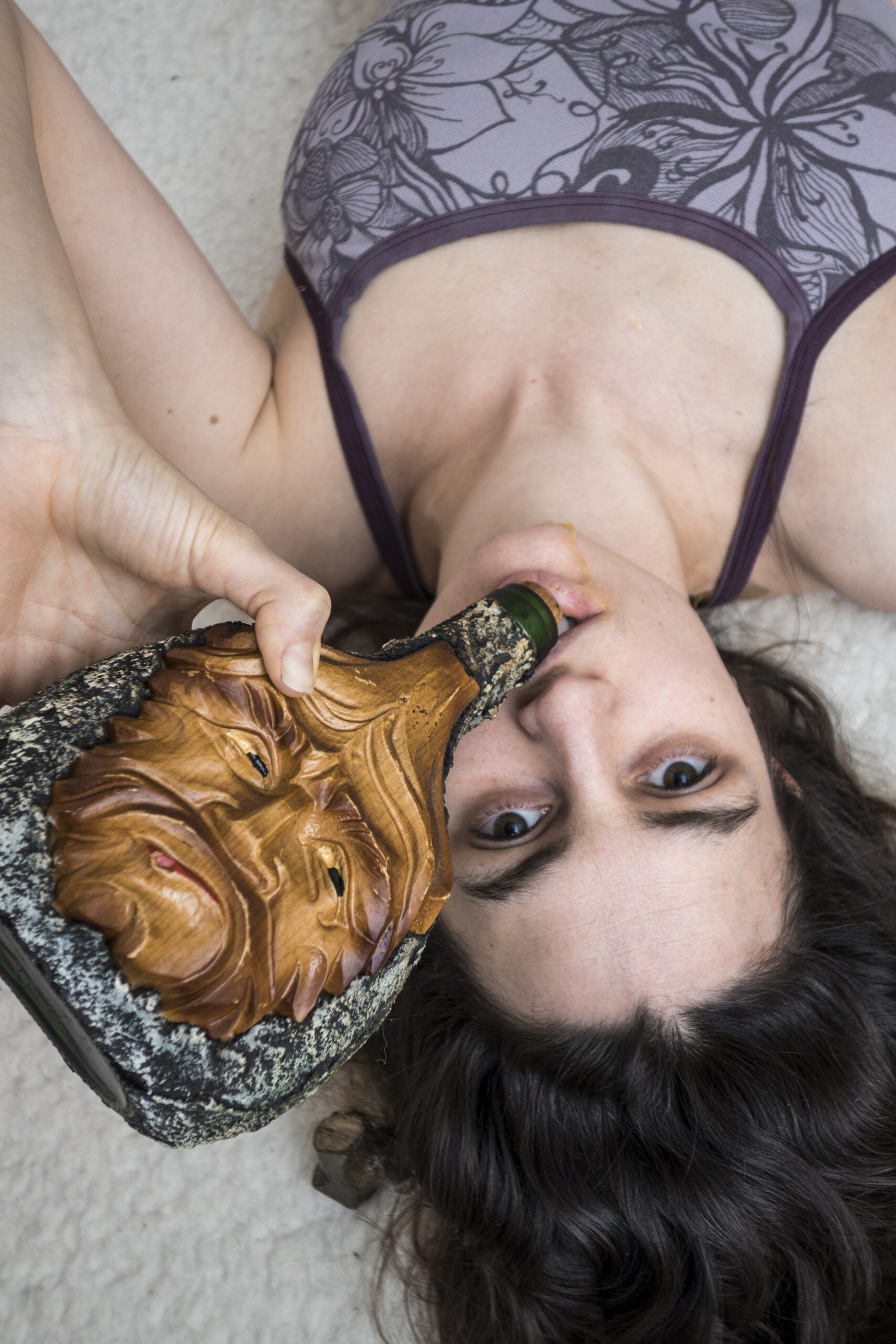
The show’s title “In the Expanded Penalty Box,” is a reference to Rosalind Krauss’ theory that Vogel describes as a concept of sculpture framed by new, additional parameters since the 1970s. “I want to add another layer, a moral layer to Krauss’ theory,” she offers. “The penalty box in a soccer game is the area in front of the goal where everything you do is more punished than in other fields. For the artist, the penalty box is a metaphor for a very risky area: the gallery. This is the place where the artist risks punishment,” she says.
Vogel steps out of the scanner and walk over to Vergleiche Vergleichen (Compare Comparisons), 2023, an assemblage sculpture hanging nearby that is made from an antique scale, recyclable plastic, oil lacquer, and oil paint on leather (from free-range goats and deer). Two leather hides hang down, featuring paintings of, Vogel explains, important yet contrasting thinkers who exemplify the question sending a rift through the country’s society: How to grapple with the past when addressing the present?
“I think the audience needs some time to get to know my practice, which is not so clear or easily readable from the beginning.”
“This is Jürgen Habermas,” she says, directing our gaze to one of the portraits. “The best known living philosopher in the German language. It was important that in the ’80s he said that the Holocaust was a singularity and thus incomparable to any other political crime. That started a really new memory culture, and society started to really think about it as incomparable,” Vogel says, adding “although this was all very late, I mean not until the ’80s.” Nowadays, postcolonial studies have a different view, which Vogel underscores. “Without necessarily denying this singularity, they point to other contexts and other histories,” she remarks as she turns to the philosopher and postcolonial political theorist Achille Mbembe. “Of course, one can also say that because the Holocaust was the most horrific, it must be compared to other instances.”
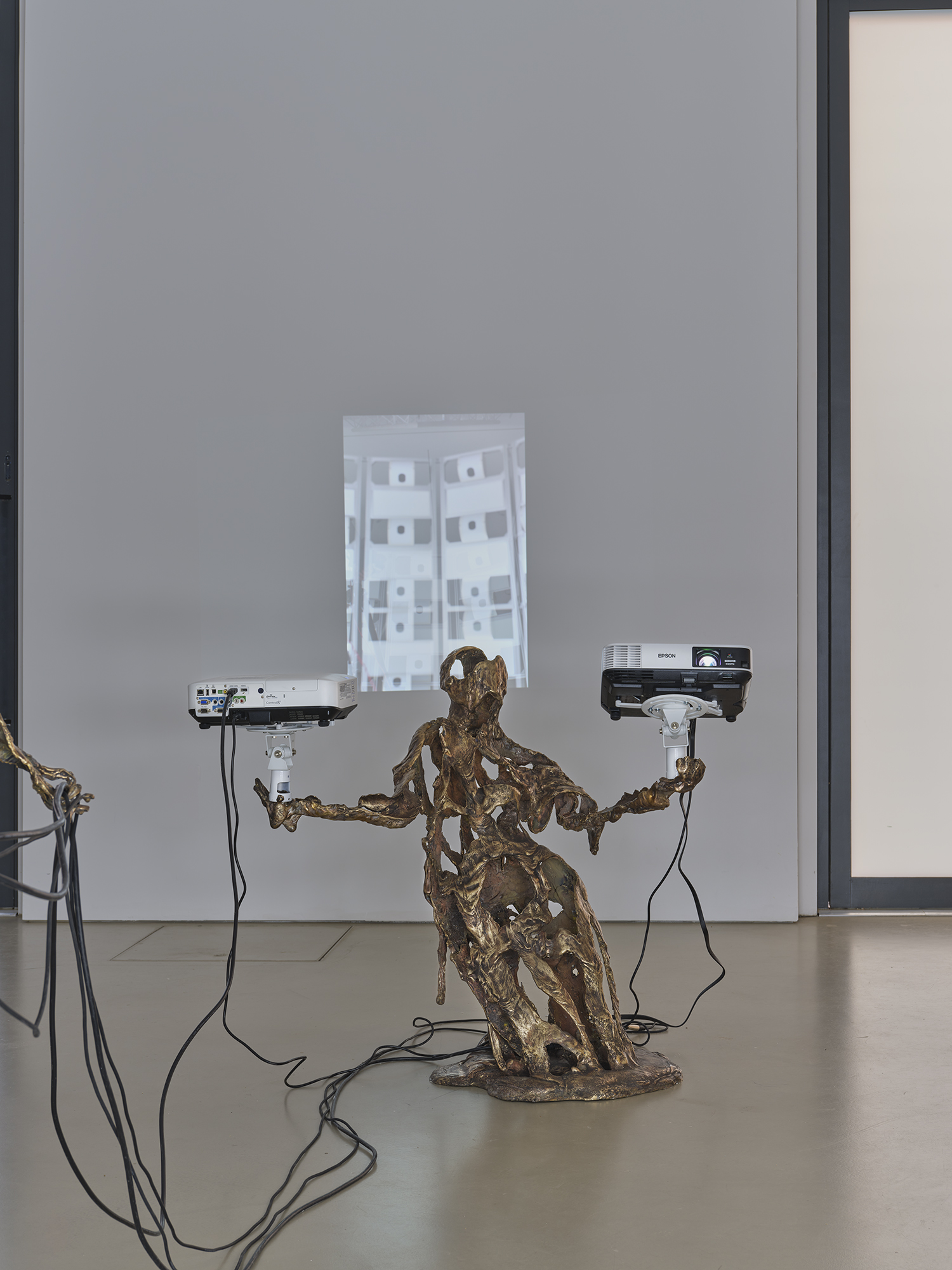
Today, institutions in Germany currently follow the state-supported doctrine that states that unlimited solidarity with Israel is the only appropriate consequence of the Nazi-past. They do not deal in nuance and instead embrace a broad, working definition for anti-Semitism that includes a clause that prohibits criticism of the state of Israel. On the other hand, many artists see Mbembe (who has drawn pushback from conservatives for likening the apartheid in South Africa to the experience of the Palestinians) as a guiding voice in understanding the complexities of the current situation. Unable to openly engage with Mbembe’s theory in her homeland, Vogel’s New York outpost offers a new avenue for discourse, although admittedly Americans will not recognise the nuances as readily as her German audience.
Yet, Vogel hopes her work is not seen as intrinsically German. Rather, her tender rendition of Hopp’s music, interwoven into her nonlinear practice, evokes multiple perspectives at once. By confronting the charged space of the gallery and of spaces in general, Vogel applies the micro and macro to examine and expand facets of memory culture, technogenesis, and historical consciousness. While philosophy and theory might offer an important context to the artist’s work, she sees it as a footnote. “The elaboration of the artwork and the memory of the Hopp family interests me much more than the contemporary German discourse on this,” she clarifies.
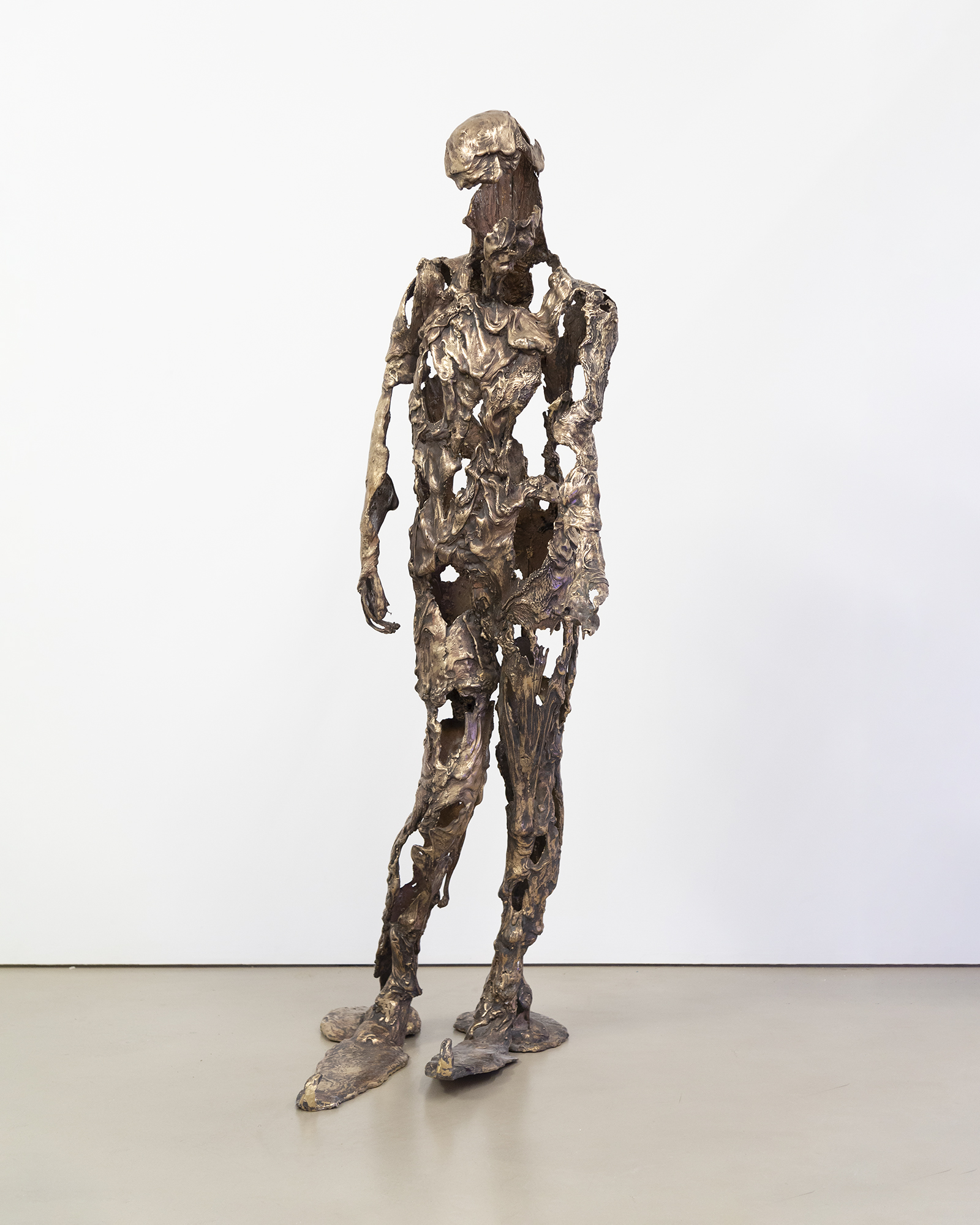
Yet, Vogel emphasises that the art world is a space that should be a platform for discourse. “I’m not sure how this can happen,” she posits. “At the moment, it’s not on the right track, and I hope it won’t become more polarised.” She cites Berlin- and Amsterdam-based, Israeli-born artist and filmmaker Yael Bartana’s representation of Germany at the Venice Biennale as a step in the right direction. “It is the best thing you can do at the moment for German discourse.”
In “In the Expanded Penalty Box,” the structure and the techniques, the materials and sounds and cameras, coalesce as a kind of trojan horse for provoking moral and political questions across time and space. Yet Vogel is not there to offer any partisan answers—the conclusion, her works suggest, is in the eye of the beholder.
“There’s so much going on in the show,” she says. “I think the audience needs some time to get to know my practice, which is not so clear or easily readable from the beginning,” she muses. As Vogel travels back to Berlin to prepare for three solo projects coming up in the next months in institutions in Germany, she will leave her work here, in New York, for the city’s art world to mull over.
Written by Meka Boyle
Raphaela Vogel: “In the Expanded Penalty Box: Did You Happen to See the Most Beautiful Fox?” at Petzel, 520 W 25th Street until February 17, 2024
Find Out More